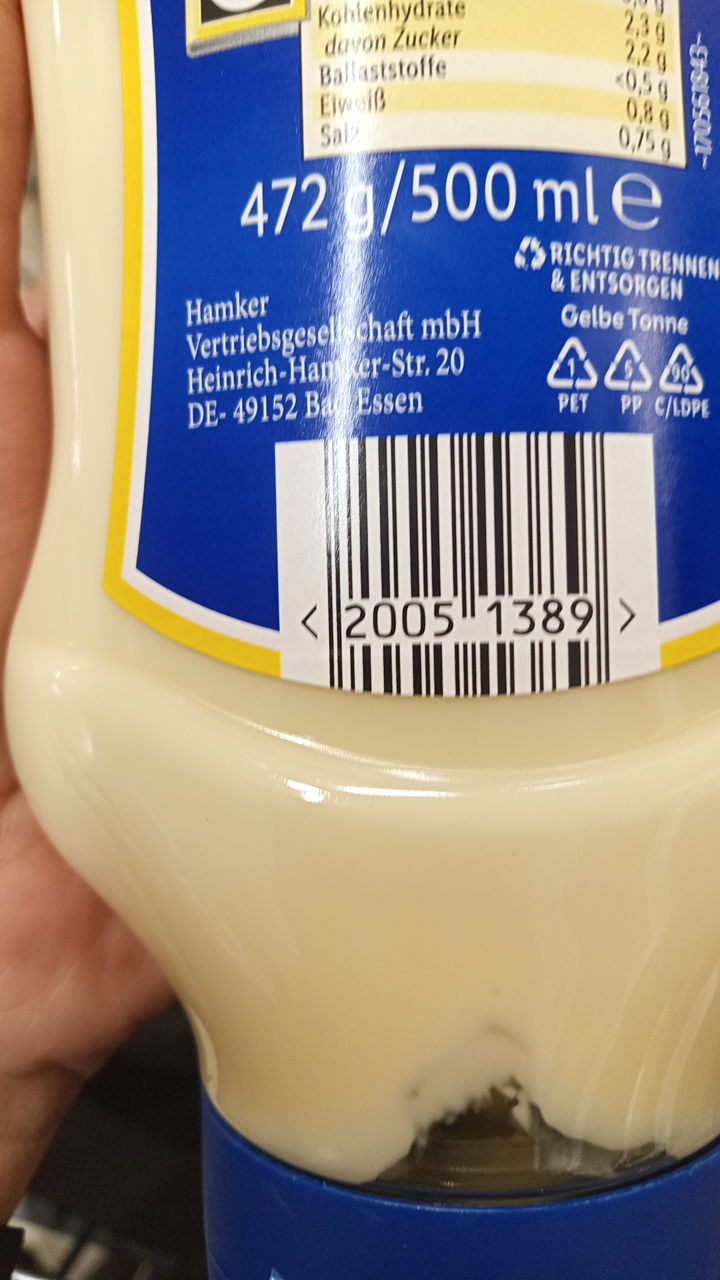
Barcode: 220005461389
mayonnaise
HALAL
📝 Reason: All listed ingredients (carbohydrates, sugar, dietary fiber, protein [egg], and salt) are inherently Halal as per Islamic law, provided no Haram (forbidden) substances or additives (like pork, alcohol, or Haram E-codes) are present. No Haram E-codes or ingredients with doubtful Halal status are found. Refer to Quran 5:3 and IFANCA Halal guidelines for reference.
🏷️ Category: Condiment
📄 Certificates: 472 G/500 Ml, Richtig Trennen & Entsorgen, Gelbe Tonne, Pet, Pp, C/Ldpe
Ingredients:
Details
Understanding the Halal Status of Mayonnaise
In the culinary world, mayonnaise is a popular condiment enjoyed by many. However, for those adhering to Halal dietary laws, it is essential to ascertain whether mayonnaise is Halal compliant. In this article, we will delve into the Halal status of mayonnaise, examining its ingredients, the absence of any Haram substances, and understanding the guidelines that affirm its Halality.
Mayonnaise Ingredients Breakdown
The primary ingredients in mayonnaise, as identified, include kohlenhydrate (carbohydrates), zucker (sugar), ballaststoffe (dietary fiber), eiweiß (protein), and salz (salt). Each of these components plays a pivotal role in the overall composition and flavor profile of mayonnaise.
Ingredient Analysis
- Kohlenhydrate (Carbohydrates): According to Halal dietary laws, carbohydrates are generally derived from plant-based sources including grains, vegetables, and fruits, making them inherently Halal. No Haram components are associated with carbohydrates, ensuring their compliance with Islamic dietary restrictions. (Source: Halal Food Authority)
- Zucker (Sugar): Sugar can come from sugarcane or sugar beets. It remains Halal unless refined using animal bone char, which is infrequently utilized in Europe in sugar processing. Therefore, in typical mayonnaise formulations, the sugar here is considered Halal. (Source: Halal Food Authority)
- Ballaststoffe (Dietary Fiber): This ingredient aids in digestion and is derived from plant sources. Dietary fiber is always Halal unless mixed with Haram additives, which is not the case here. (Source: NHS)
- Eiweiß (Protein): Generally referring to egg whites in mayonnaise, this component is Halal according to Islamic dietary guidelines, unless adulterated with Haram substances. Eggs are a staple in many diets and well accepted within Halal legislation. (Source: IFANCA)
- Salz (Salt): Being a mineral, salt is universally Halal. It does not enter any socio-religious debates concerning Halal compliance and adds flavor to the mayonnaise without compromising its Halal status. (Source: IFANCA)
No Haram E-Codes Present
Crucially, an examination of the ingredients indicates that there are no E-numbers associated with pork products or alcohol within the mayonnaise in question. This further solidifies its Halal status.
Certification and Brands
Although mayonnaise has not been branded in this case, it is essential to note that Halal certification can vary by manufacturer. For individuals keen on confirming the Halal status of their purchased mayonnaise, looking for Halal certifications from recognized authorities is highly recommended. Certification ensures manufacturers adhere to stringent regulations that align with Islamic dietary laws.
Conclusion
In conclusion, mayonnaise is indeed Halal if made from the listed ingredients without mixing in any Haram additives, and when properly certified. Consumers can rest assured that they can enjoy this versatile condiment without compromising their dietary beliefs. Always check for certifications for peace of mind and make informed choices guided by sources like the Quran and Halal organizations.
